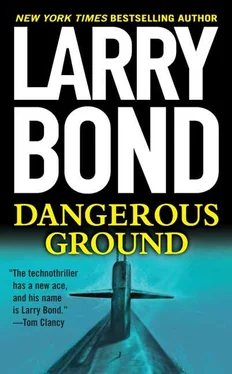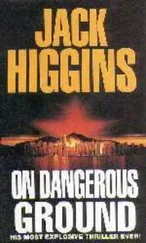Hugging the bottom, Memphis crept and inched her way northeast into shallower and shallower water. Berg kept his eyes on the chart and made sure the boat was never more than sixty feet off the bottom. “Sir, I recommend coming left ten degrees. There’s a deeper spot at three two zero relative, and it also puts us on a more northerly course.”
“Stay on this course, mister.” Hardy shook his head. “They were waiting for us in one deep spot. Right now, if I could, I’d put wheels on this boat.”
“Aye, aye, sir,” Berg replied.
Jerry rapidly called out the depth changes, “Depth is four two zero feet and shoaling.” He tried not to sound worried. So what if the charts were incomplete? So what if the Russians were chasing them?
The sudden call on the intercom shocked them all. “Conn, sonar. Engine noises off the port bow. Multiple contacts.”
Hardy took over. “Mr. Berg, I have the conn. Increase speed to ten knots, right fifteen degrees rudder, steady on course zero nine zero. Mr. Berg, watch our depth.”
“Aye, aye, sir. Our depth is good for the next mile on this course.”
“Right fifteen degrees rudder, steady on course zero nine zero, helm aye.”
“Maneuvering making turns for ten knots.”
“Very well,” replied Hardy to the stream of reports, his eyes shifting quickly between the sonar display, fire control, and the nav chart.
“Sonar, conn. What can you tell me about those contacts?”
“Conn, sonar. I’ve got four surface contacts close aboard. They appeared suddenly and I’m getting high blade rates on all of them. I believe they were loitering in the area and now they’ve increased speed to close on us. They currently bear between zero four four and zero six five.” After a moment’s pause, the sonar operator added, “Conn, sonar. Detecting Bull Horn transmissions. Same bearings as the surface contacts.”
The report was largely redundant, as the acoustic intercept receiver started bleeping its warning tones as soon as the ships above them lit off their sonars.
That would put them right over that deeper spot that Lenny had wanted to use, Jerry thought. The Russians were using the landscape to their advantage. But how had they known Memphis was passing by? And where did those ships come from? We didn’t hear them at all!
Another buoy field, he thought. They knew Memphis would leave the trench once she heard the explosions and flushed her from one trap toward another: toward the hunters sitting in a duck blind.
The Captain continued to work with sonar. “Sonar, conn. What is the bearing rate of the surface contacts?”
“Conn, sonar. Very slight right drift, sir, and their blade rate’s increasing, they’re cavitating. I think they’re building up to maximum speed.”
“Man battle…”
Rippling thunder interrupted Hardy’s order. A deep rumble filled the air inside the boat and stopped all activity, every quiet conversation. It was a rough, uneven noise that rose and fell, but as it fell, Jerry felt a mild vibration in the deck and the bulkhead. The Russians were shooting at them.
“Launch an NAE beacon!” Hardy ordered. “Man battle stations. Change course to three five zero, speed twelve knots. Mr. Berg, our depth?”
“We can increase depth to two hundred feet, sir. As long as we’re heading northwest at all, the slope will be downward.”
“Conn, sonar. Multiple clusters of explosions to port and starboard. Evaluated as RBU 6000 fire.” It was old news, but knowing the explosion’s location and identifying the weapon was helpful, if distressing.
Hardy nodded to Berg, then pressed the key on the intercom. “My intention is to run under them and get in their baffles while they try to sort out that countermeasure.”
Berg cautioned, “We risk leaving a wake at this speed and depth, sir.”
“I’m hoping they’ll miss it in the roiled water from the attack. Make your depth one eight zero feet,” the Captain ordered. “That should help as well.”
Lieutenant Commander O’Connell, the Navigator and battle stations OOD, came in and quickly relieved Lenny Berg. That freed up Jerry as well, and he hurried down to the torpedo room.
Most of the torpedo division was already at their stations. Jerry saw Senior Chief Foster fussing with the firing panel. He’d already declared it dead, even cremated, but he wouldn’t stop trying to resurrect it.
The phone talker, TM2 Boyd, saw Jerry and said, “Control wants to man stations for Manta launch, just in case. We’re still at ultra-quiet.”
Jerry quickly put on his phones and started checking the panel. Davidson and Greer were already at their launch positions.
Even before Jerry could report the Manta ready for operations, the control room talker reported, “The Captain wants to know the status of the Manta’s battery.”
Jerry didn’t have to look at the gauge. It was the first thing he’d checked. “Forty-seven percent. Call it three and a half hours at ten knots.”
The phone talker replied, “Forty-seven percent, control aye,” and that was it.
The silence on the phone line pulled at him, demanding to be filled, but Jerry forced himself to be patient. The Russians were close aboard, and all he could do was wait. They might secure in half an hour or they might be here tomorrow morning, still having done nothing. Hopefully having done nothing, he corrected himself.
Jerry checked the space, making sure that everyone was quiet and on the job. The men sat or stood at their stations quietly, speaking in whispers. Foster had several tech manuals out and was leafing through them, being careful to turn the pages quietly.
Another rumble made them turn their heads, automatically trying to locate the sound, which was nearly impossible after passing through both water and a steel hull. Jerry wanted to think it was behind them. It certainly sounded fainter.
WHAAMM. Jerry felt, as well as heard the explosion. It was painful; he couldn’t tell whether from the shock or the intensity of the sound. He looked around the torpedo room in alarm, convinced that water was pouring in somewhere. It reassured him to see that the hull was still intact, but then a second, even stronger explosion rocked the sub.
Jerry had to hang on to the console to stay in his seat. Objects fell out of their racks. Foster’s coffee cup shattered on the deck. The lights failed and the battle lanterns automatically clicked on, then off a moment later as the overhead lights flickered back to life.
The first explosions, the ones Jerry had felt up in control, had been many smaller charges detonating together, like popcorn. Those were RBU-6000 ASW rockets fired by the surface ships. They had a small warhead, only about fifty pounds of explosive, but each mount fired twelve projectiles.
The last two jolts were hammer blows. Jerry had never imagined anything could be so powerful and not destroy the sub.
“Check the room and the weapons,” Foster ordered, and Jerry automatically looked at his own displays, as well as those of his men. A few were dark, and the Senior Chief ordered Boswell to reset the breakers.
As FT2 Boswell stood up and turned toward the breaker panel, a third explosion sounded, fainter than the first two. Jerry felt the vibrations and heard the rumble, and relaxed because it was so much weaker than the first two.
They weren’t prepared for the one that came next. It felt like the hammer — a giant’s maul — had hit the hull directly outside the torpedo room. Jerry only heard the beginning of the explosion; the ringing in his ears that followed was like church bells.
Boswell was thrown into the port torpedo stow and every man in the torpedo room was knocked to the deck. The lights failed again and sparks flew from cable junctions in the darkness before the circuit breakers cut the power.
Читать дальше












